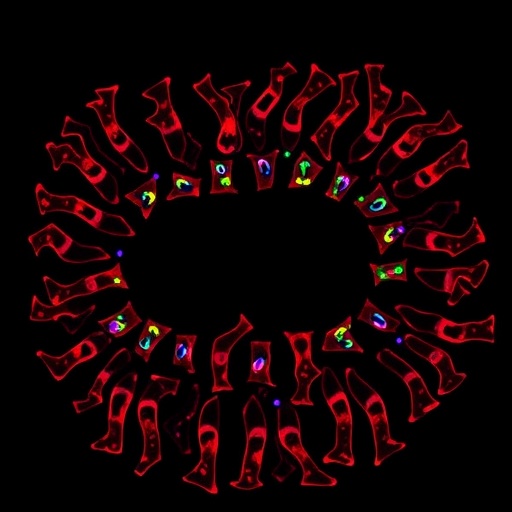New research led by Li et al. has unveiled crucial insights into the progression of colorectal cancer, identifying the non-coding RNA JHDM1D-AS1 as a pivotal player in tumor development. This study presents groundbreaking evidence suggesting that JHDM1D-AS1 potentiates cancer progression through its interaction with miR-193b-3p and HPRT1, establishing a novel molecular axis that could redefine therapeutic strategies for colorectal cancer.
Colorectal cancer stands as one of the leading causes of cancer-related deaths worldwide. Despite advancements in treatment options, many patients still face lethal outcomes, emphasizing the need for a deeper understanding of the molecular mechanisms that underpin tumor biology. The recent findings by Li et al. emerge as a beacon of hope, shedding light on the intricate interplay between non-coding RNAs and cancer-related pathways.
JHDM1D-AS1 is a long non-coding RNA (lncRNA) which has garnered attention due to its involvement in various cancers. In the current study, the authors focused on its expression levels in colorectal cancer tissues compared to normal adjacent tissues. The elevated expression of JHDM1D-AS1 correlated with advanced tumor stages and poorer overall survival, positioning it as a potential biomarker for colorectal cancer severity.
Delving deeper, the research highlighted the functional role of JHDM1D-AS1 in modulating cellular behavior. Through a series of in vitro and in vivo experiments, the authors demonstrated that silencing JHDM1D-AS1 effectively impeded cell proliferation, migration, and invasion – three hallmarks of cancer aggressiveness. These findings underscore the potential for JHDM1D-AS1 to serve not only as a diagnostic marker but also as a promising therapeutic target for intervention in colorectal cancer progression.
Central to the function of JHDM1D-AS1 is its interaction with miR-193b-3p, a microRNA known for its regulatory roles in gene expression. The authors unveiled a direct binding relationship between JHDM1D-AS1 and miR-193b-3p, positing that JHDM1D-AS1 functions as a molecular sponge for this microRNA. This interaction is significant as it highlights a crucial mechanism by which JHDM1D-AS1 can influence downstream targets essential for tumor growth and metastasis.
As the study progressed, the researchers focused on HPRT1, a gene implicated in various cellular processes, including nucleotide metabolism and cell proliferation. The findings indicate that miR-193b-3p directly regulates HPRT1. The reciprocal relationship among JHDM1D-AS1, miR-193b-3p, and HPRT1 forms a feedback loop that supports a tumor-promoting environment, providing ample evidence to consider this axis as a viable target for therapeutic intervention.
The implications of this research are far-reaching. By elucidating the role of JHDM1D-AS1 and its associated molecular pathway, the study opens avenues for developing targeted therapies designed to disrupt this axis. Such approaches could enhance treatment efficacy and patient outcomes, particularly in those with advanced colorectal cancer who often exhaust available therapeutic options.
Moreover, the study emphasizes the need for additional research in understanding the broader implications of non-coding RNAs in cancer biology. The potential to exploit molecular interactions, such as those involving JHDM1D-AS1, could transform the landscape of cancer treatment, moving toward more personalized and effective approaches that address the specific molecular signatures of tumors.
Public health initiatives will benefit from the findings as well, as characterization of JHDM1D-AS1’s role in colorectal cancer can inform screening strategies and risk assessment. Identification of high-risk individuals through genetic and molecular profiling may facilitate early intervention and improve survival rates in populations disproportionately affected by colorectal cancer.
This groundbreaking research also emphasizes the interconnectedness of different types of RNA within the cellular environment. Moving forward, it is imperative that researchers continue to investigate the regulatory networks involving lncRNAs, miRNAs, and protein coding genes. Understanding these complex relationships will undoubtedly yield further insights into cancer biology and provide new dimensions for therapeutic innovation.
The findings presented in this study mark a significant milestone in colorectal cancer research. With the groundwork laid by Li et al., future studies will likely build upon these revelations, exploring the use of JHDM1D-AS1 as both a biomarker and a therapeutic target. Such advancements could revolutionize current approaches to cancer treatment, offering hope for improved management and outcomes for patients facing this challenging disease.
In conclusion, the research led by Li, Liu, and Liu et al. provides a compelling glimpse into the role of JHDM1D-AS1 in colorectal cancer progression. The ability to influence tumor behavior through a novel molecular axis involving miR-193b-3p and HPRT1 holds promise for developing innovative therapeutic strategies. As the scientific community delves deeper into the complexities of cancer biology, findings like those of JHDM1D-AS1 will play a transformative role in shaping the future of cancer research and treatment.
Subject of Research: Colorectal cancer progression via the JHDM1D-AS1/miR-193b-3p/HPRT1 axis.
Article Title: JHDM1D-AS1 Facilitates Progression of Colorectal Cancer via the miR-193b-3p/HPRT1 Axis.
Article References:
Li, Y., Liu, W., Liu, C. et al. JHDM1D-AS1 Facilitates Progression of Colorectal Cancer via the miR-193b-3p/HPRT1 Axis.
Biochem Genet (2025). https://doi.org/10.1007/s10528-025-11298-7
Image Credits: AI Generated
DOI: https://doi.org/10.1007/s10528-025-11298-7
Keywords: Non-coding RNA, colorectal cancer, tumor progression, JHDM1D-AS1, miR-193b-3p, HPRT1, therapeutic target, molecular axis, cancer biology.




